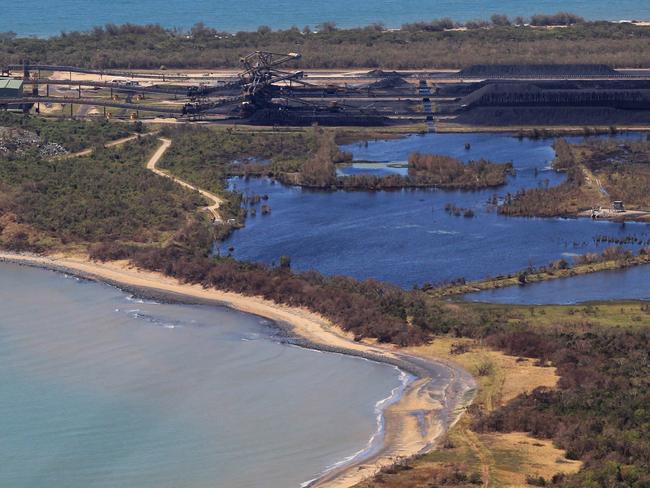Adani coal port under investigation from Queensland Government for sediment run-off
ADANI is facing a new investigation by the Queensland Government into its operations after water released at its Abbot Point facility was found to contain eight times the permitted level of sediment.
QLD News
Don't miss out on the headlines from QLD News. Followed categories will be added to My News.
- Adani Carmichael coal mine to have financing completed by June
- Resources Council CEO labels anti-Adani activists anarchists
- Palaszczuk Government investigates Adani’s Abbot Point water
QUEENSLAND’S environment department is considering compliance action against coal miner Adani after water released from its Abbot Point facility during Cyclone Debbie contained eight times more sediment than allowed.
Adani was granted a temporary license to assist with site water management during and after the cyclone that hit north Queensland.
But it was only authorised to release water with sediment levels of up to 100 milligrams per litre, while test samples showed up to 806mg/L of sediment. Adani confirmed none of the run-off had entered nearby wetlands.

“Adani Australia confirms that it advised DEHP of a high sediment level in a sump pond inside the Abbot Point designated area,” it said in a statement on Wednesday night.
“The ponds are part of the Abbot Point facility’s measures to contain run off.
“(Department of environment) officers have confirmed to Abbot Point management that there was no evidence of environmental harm post Cyclone Debbie.”
The Department’s director general Jim Reeves said it was still investigating whether any of the sediment had leeched into nearby waterways.
“I want to assure all Queenslanders that as the environmental regulator EHP takes these matters very seriously,” he said in a statement on Wednesday night.
“(The department) will prepare a full report on its investigations which will provide the basis for decisions on what, if any, compliance action will occur.”
Environmental groups have previously expressed concerns about the impact the Abbot Point terminal would have on the local environment.
Queensland Conservation Council head Dr Tim Seelig said the spill confirmed their fears.
“This case highlights that we need a review of the whole model of Temporary Emissions Licences, when this has been used to circumvent existing limits to environmental damage,” he said.
“It is not acceptable that coal ports get away with poor planning and expect temporary licences to be issued as a matter of course.”


